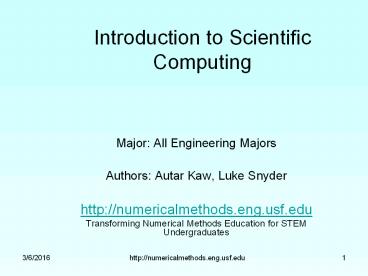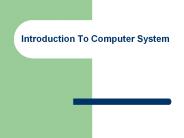Introduction to Scientific Computing - PowerPoint PPT Presentation
1 / 37
Title:
Introduction to Scientific Computing
Description:
Title: Introduction to Scientific Computing Author: Autar Kaw, Luke Snyder Last modified by: autar Created Date: 11/18/1998 4:33:10 PM Document presentation format – PowerPoint PPT presentation
Number of Views:107
Avg rating:3.0/5.0
Title: Introduction to Scientific Computing
1
Introduction to Scientific Computing
- Major All Engineering Majors
- Authors Autar Kaw, Luke Snyder
- http//numericalmethods.eng.usf.edu
- Transforming Numerical Methods Education for STEM
Undergraduates
2
Introduction
3
My advice
- If you dont let a teacher know at what level you
are by asking a question, or revealing your
ignorance you will not learn or grow. - You cant pretend for long, for you will
eventually be found out. Admission of ignorance
is often the first step in our education. - Steven CoveySeven Habits of Highly Effective
People
4
Why use Numerical Methods?
- To solve problems that cannot be solved exactly
5
Why use Numerical Methods?
- To solve problems that are intractable!
6
Steps in Solving anEngineering
Problemhttp//numericalmethods.eng.usf.edu
7
How do we solve an engineering problem?
8
Example of Solving an Engineering Problem
9
Bascule Bridge THG
10
Bascule Bridge THG
Hub
Trunnion
Girder
11
Trunnion-Hub-Girder Assembly Procedure
Step1. Trunnion immersed in dry-ice/alcohol Step2.
Trunnion warm-up in hub Step3. Trunnion-Hub
immersed in
dry-ice/alcohol Step4. Trunnion-Hub warm-up into
girder
12
Problem
- After Cooling, the Trunnion Got Stuck in Hub
13
Why did it get stuck?
- Magnitude of contraction needed in the trunnion
was 0.015 or more. Did it contract enough?
14
Video of Assembly Process
Unplugged Version
VH1 Version
15
Consultant calculations
16
Is the formula used correct?
T(oF) a (µin/in/oF)
-340 2.45
-300 3.07
-220 4.08
-160 4.72
-80 5.43
0 6.00
40 6.24
80 6.47
17
The Correct Model Would Account for Varying
Thermal Expansion Coefficient
18
Can You Roughly Estimate the Contraction?
Ta80oF Tc-108oF D12.363
19
Can You Find a Better Estimate for the
Contraction?
Ta 80oF Tc -108oF D 12.363"
20
Estimating Contraction Accurately
Change in diameter (?D) by cooling it in dry
ice/alcohol is given by
Ta 80oF Tc -108oF D 12.363"
21
So what is the solution to the problem?
- One solution is to immerse the trunnion in liquid
nitrogen which has a boiling point of -321oF as
opposed to the dry-ice/alcohol temperature of
-108oF.
22
Revisiting steps to solve a problem
1) Problem Statement Trunnion got stuck in the
hub. 2) Modeling Developed a new model
3) Solution 1) Used trapezoidal rule OR b) Used
regression and integration. 4) Implementation
Cool the trunnion in liquid nitrogen.
23
- THE END
- http//numericalmethods.eng.usf.edu
24
Introduction to Numerical MethodsMathematical
Procedures
- http//numericalmethods.eng.usf.edu
25
Mathematical Procedures
- Nonlinear Equations
- Differentiation
- Simultaneous Linear Equations
- Curve Fitting
- Interpolation
- Regression
- Integration
- Ordinary Differential Equations
- Other Advanced Mathematical Procedures
- Partial Differential Equations
- Optimization
- Fast Fourier Transforms
26
Nonlinear Equations
How much of the floating ball is under water?
Diameter0.11m Specific Gravity0.6
27
Nonlinear Equations
How much of the floating ball is under the water?
28
Differentiation
What is the acceleration at t7 seconds?
29
Differentiation
What is the acceleration at t7 seconds?
Time (s) 5 8 12
Vel (m/s) 106 177 600
30
Simultaneous Linear Equations
Find the velocity profile, given
Time (s) 5 8 12
Vel (m/s) 106 177 600
Three simultaneous linear equations
31
Interpolation
What is the velocity of the rocket at t7 seconds?
Time (s) 5 8 12
Vel (m/s) 106 177 600
32
Regression
Thermal expansion coefficient data for cast steel
33
Regression (cont)
34
Integration
Finding the diametric contraction in a steel
shaft when dipped in liquid nitrogen.
35
Ordinary Differential Equations
How long does it take a trunnion to cool down?
36
Additional Resources
- For all resources on this topic such as digital
audiovisual lectures, primers, textbook chapters,
multiple-choice tests, worksheets in MATLAB,
MATHEMATICA, MathCad and MAPLE, blogs, related
physical problems, please visit - http//numericalmethods.eng.usf.edu/topics/introd
uction_numerical.html
37
- THE END
- http//numericalmethods.eng.usf.edu






























